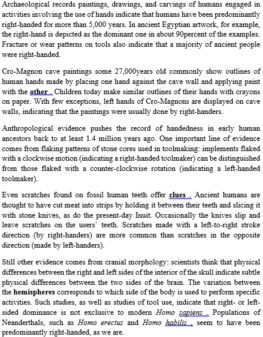Read the following passage and mark the letter A, B, C, or D on your answer sheet to indicate the correct answer to each of the questions from 30 to 3 4.
In Africa, people celebrate with joy the birth of a new baby. The Pygmies would sing a birth-song to the child. In Kenya, the mother takes the baby strapped to her back into the thorn enclosure where the cattle are kept. There, her husband and the village elders wait to give the child his or her name.
In West Africa, after the baby is eight days old, the mother takes the baby for its first walk in the big, wide world, and friends and family are invited to meet the new baby. In various African nations, they hold initiation ceremonies for groups of children instead of birthdays. When children reach a certain designated age, they learn the laws, beliefs, customs, songs and dances of their tribes. Some African tribes consider that children from nine to twelve are ready to be initiated into the grown up world. They may have to carry out several tests.
Maasai boys around thirteen years old to seventeen undergo a two-stage initiation. The first stage lasts about three months. The boys leave their parents' homes, paint their bodies white, and are taught how to become young warriors. At the end of this stage, they have their heads shaved and they are also circumcised. At the second stage, the young warriors grow their hair long and live in a camp called a “manyatta” where they practice hunting the wild animals that might attack the Maasai herds. This stage may last a few years. When they are ready, they will marry and become owners of large cattle herds like their fathers. The girls are initiated when they are fourteen or fifteen. They are taught by the older women about the duties of marriage and how to care for babies. Soon after that they are married and lead a life similar to that of their mothers.
Which of the following is NOT mentioned in paragraph 2?
A. An eight-day-old child will be taken for the first walk by his or her mother
B. Children have to learn their tribes' cultures and traditions when they are old enough
C. Children are initiated for a mature life in the presence of their friends and family
D. Children have to overcome a few trials to enter the grown-up world




Điều nào sau đây KHÔNG được đề cập trong đoạn 2?
A. Một đứa trẻ tám ngày tuổi sẽ được mẹ dắt những bước đi đầu tiên.
B. Trẻ em phải học văn hóa và truyền thống của bộ tộc khi đủ tuổi.
A. Trẻ em được bắt đầu cho một cuộc sống trưởng thành với sự hiện diện của bạn bè và gia đình của chúng.
D. Trẻ em phải vượt qua một vài thử thách để bước vào thế giới của người lớn.
Thông tin: In various African nations, they hold initiation ceremonies for groups of children instead of birthdays.
Tạm dịch: Ở nhiều quốc gia châu Phi khác nhau, họ tổ chức các buổi lễ khởi đầu cho các nhóm trẻ em thay vì sinh nhật.
- In West Africa, after the baby is eight days old, the mother takes the baby for its first walk in the big, wide world, and friends and family are invited to meet the new baby. => loại A
- When children reach a certain designated age, they learn the laws, beliefs, customs, songs and dances of their tribes. => loại B
- Some African tribes consider that children from nine to twelve are ready to be initiated into the grown up world. They may have to carry out several tests. => loại D
Chọn C